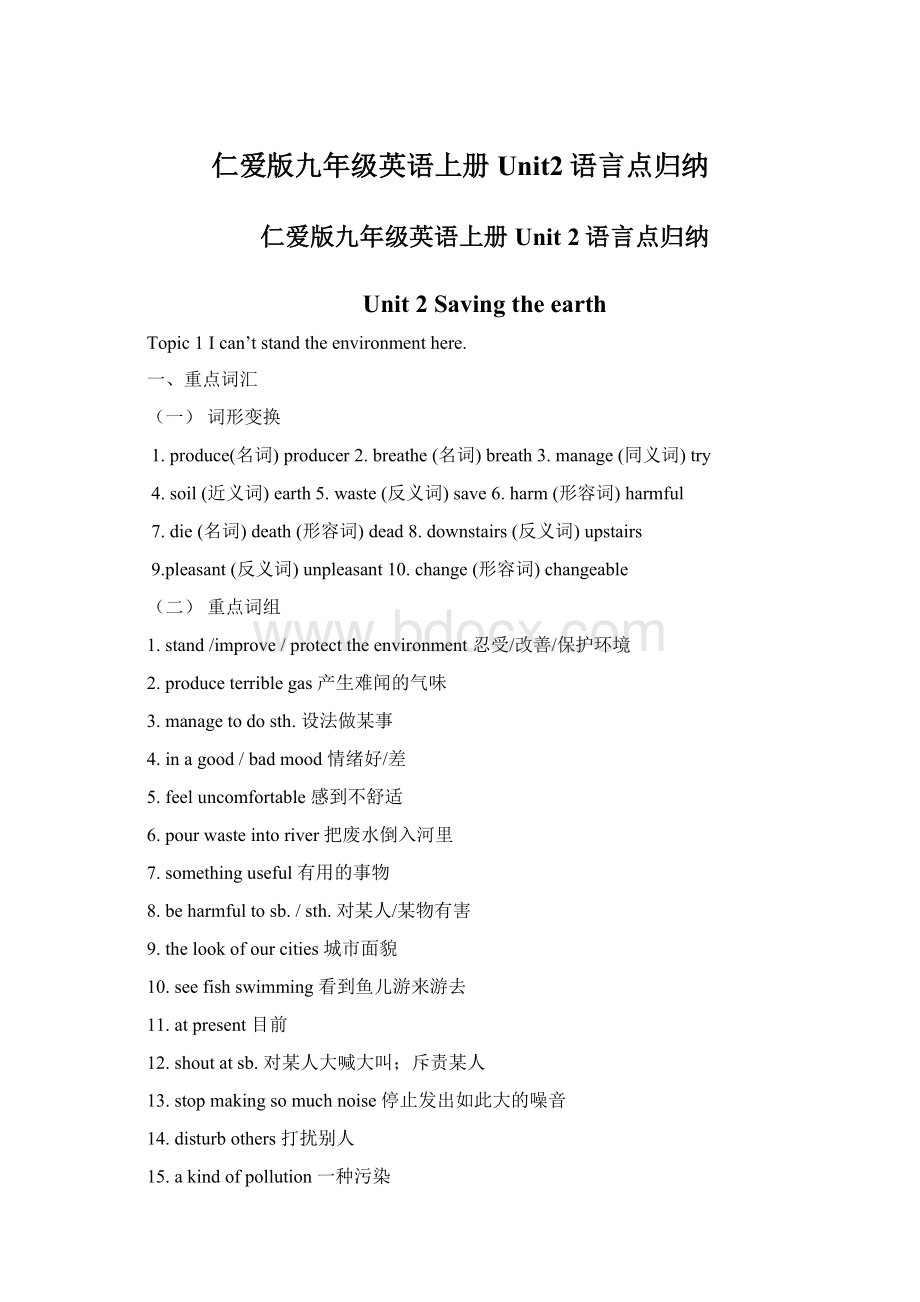仁爱版九年级英语上册Unit2语言点归纳.docx
《仁爱版九年级英语上册Unit2语言点归纳.docx》由会员分享,可在线阅读,更多相关《仁爱版九年级英语上册Unit2语言点归纳.docx(13页珍藏版)》请在冰豆网上搜索。

仁爱版九年级英语上册Unit2语言点归纳
仁爱版九年级英语上册Unit2语言点归纳
Unit2Savingtheearth
Topic1Ican’tstandtheenvironmenthere.
一、重点词汇
(一)词形变换
1.produce(名词)producer2.breathe(名词)breath3.manage(同义词)try
4.soil(近义词)earth5.waste(反义词)save6.harm(形容词)harmful
7.die(名词)death(形容词)dead8.downstairs(反义词)upstairs
9.pleasant(反义词)unpleasant10.change(形容词)changeable
(二)重点词组
1.stand/improve/protecttheenvironment忍受/改善/保护环境
2.produceterriblegas产生难闻的气味
3.managetodosth.设法做某事
4.inagood/badmood情绪好/差
5.feeluncomfortable感到不舒适
6.pourwasteintoriver把废水倒入河里
7.somethinguseful有用的事物
8.beharmfultosb./sth.对某人/某物有害
9.thelookofourcities城市面貌
10.seefishswimming看到鱼儿游来游去
11.atpresent目前
12.shoutatsb.对某人大喊大叫;斥责某人
13.stopmakingsomuchnoise停止发出如此大的噪音
14.disturbothers打扰别人
15.akindofpollution一种污染
16.besorryfordoingsth.对做了某事感到抱歉
17.fromnowon从现在起
18.innoisyconditions在吵杂的条件下
19.becomedeaf变聋了
20.quiteafew相当少
21.nobetterthan(几乎)与……一样差
22.causehighbloodpressure引发高血压
23.instrong,changeablelight在强烈、易变的光线下
二、重点句型。
1.Itisdifficultformetobreathe.对我来说很难呼吸。
2.----Howlonghaveyoubeenlikethis?
你处于这样的状态多久了?
----Ihavebeenlikethissincelastmonth.自从上个月以来我一直这样。
3.Itisabeautifulplacewithflowersandgrass.那是个有花、有草的美丽的地方。
4.Alltheflowers,grassandfishhavegone!
所有的花、草和鱼儿都没有了!
5.Itsmellsterrible.难闻极了。
6.Thereareseveralchemicalfactoriespouringwastewaterintotheriver.
有几座工厂正往河里排放污水。
7.It’sourdutytoprotecttheenvironment.保护环境是我们的职责。
8.Ihavebeenatthisschoolsincelastyear/foroneyear.
自从去年,我在这个学校了。
/我来到这个学校有一年了。
9.Noiseisakindofpollutionanditisharmfultoourears.
噪音是一种污染,对我们的耳朵有害。
三、重点语言点
1.Ican’tstandtheenvironmenthere.我无法容忍这儿的环境。
stand表“容忍;忍受”,后接名词、代词及动名词做宾语。
如:
Ican’tstandthatman,hetalkstoomuch.我忍受不了那个人了,他话太多了。
Canyoustandthepain?
你能忍得住痛吗?
Ican’tstandwaitinganylonger.我再也等不了了。
2.Whatdoyoumeanbysth.?
某物是什么意思呢?
=What’sthemeaningofsth?
=Whatdoessth.mean?
3.IhopeIcanmovefromheresoon.我希望我能早点从这儿搬走。
当主从句主语一致时,常可转换成不定式短语
=Ihopetomovefromheresoon.我希望早点从这儿搬走。
4.Thereareseveralchemicalfactoriespouringwastewaterintotheriver.
有几座工厂正往河里排放污水。
Therebe+sb./sth.+doingsth.表有某人/某物正在做某事。
如:
Therearesomebirdssinginginthetree.树上有些鸟儿在歌唱。
Thereisalittlegirlcryinginthestreet.街上有个小女孩在哭。
5.stopdoingsth.停止做(正在进行的)事
stoptodosth.停下来去做(另一件)事
如:
It’slate.Theywillstopworkingand(stop)tohavesupper.
很迟了。
他们将停下来吃晚饭。
Thestudentsstoppedtalkingandtolistentotheteacher.学生们停止说话去听课。
6.I’msorryformakingsomuchnoise.很抱歉我弄出这么大的噪音。
besorryfordoingsth.表对做过的事感到抱歉
besorrytodosth.表对当前的事感到抱歉
如:
I’msorryforwakingyouupyesterday.很抱歉昨天把你弄醒了。
I’msorrytotroubleyou.很抱歉打扰你了。
I’msorrytohearthat.听到那个(消息)感到很遗憾。
7.…,notallpeopleknowthatnoiseisalsoakindofpollution.
并不是所有的人都知道噪音也是一种污染。
not与both、all、every以及every的派生词连用时,表部分否定。
如:
Noteverybodyknowsthissecret.不是人人知道这个秘密。
Nobodyknowsthissecret.没有一个人知道这个秘密。
Idon’tknowall(of)yournames.你们的名字我并不都知道。
Iknownoneofyournames.我不知道你们所有人的名字。
8.RecentlyitwasreportedthatmanyteenagersinAmericacanhearnobetterthan65-year-oldpeopledo,…近来据报道,美国许多青少年的听力和65岁的老人一样差。
nobetterthan…表“同……(几乎)一样差;不比……做得好”
如:
LucydidnobetterthanLilyintheexam.露西和莉莉考得几乎一样糟.
=LucyalmostdidasbadlyasLilyintheexam.
四、重点语法
现在完成时中延续性的动作或状态和由for/since引导的一段时间状语搭配使用。
a)“for+时间段”与“since+时间点”都表“一段时间”,常用Howlong提问。
如:
----Howlonghaveyoubeenlikethis?
----Ihavebeenlikethissincelastmonth./foramonth.
----HowlonghaveyoulivedinChangle?
----IhavelivedinChanglefortenyears/sincetenyearsago.
b)如句中含有非延续性动词,则改为相应的延续性动词或状态。
如:
IboughtthisTVthreedaysago.=IhavehadthisTVforthreedays.
Hiscatdiedyesterday.=Hiscathasbeendeadsinceyesterday.
※常见的非延续性动词转换成延续性动词如下:
come—behere;go—bethere;close—beclosed;open—beopen;
buy—have;borrow—keep;leave—beaway;begin—beon;
finish—beover;die—bedeadetc.
Topic2Howdoespollutionhurttheearth?
一、重点词汇
(一)词形变换
1.none(反义词)all2.both(反义词)neither3.rubbish(同义词)litter
4.teal(过去式)stole(过去分词)stolen5.spit(过去式;过去分词)spat
6.behave(名词)behavior7.prevent(同义词)stop8.although(同义词)though9.pollute(句词)pollution10.completely(形容词)complete
(二)重点词组
1.readthisarticle看这篇文章
2.hereandthere=everywhere到处
3.carefor=lookafter=takecareof照顾
4.givesomeadviceto…提出一些建议给……
5.setone’smindtosth.集中精力于……;用心于……
6.protectnature保护自然
7.washaway冲走
8.blowaway吹走;刮走
9.turninto=changeinto转变成
10.dieout灭绝;绝迹
11.stop/prevent…(from)doingsth.阻止……做某事
12.keep…fromdoingsth.阻止……做某事
13.movetoward…朝……移动
14.cutdown砍倒
15.runaway跑走;流走
16.cutoff中断
17.ontheearth在地球上
18.beindangerof(doing)sth.处于做某事的危险中
19.destroy/harm/pollutetheenvironment破坏/损害/污染环境
20.haveaquietlife过着平静的生活
21.plentyof大量的
22.cometorealize开始意识
23.haveaclean-up大扫除
24.oneafteranother一个接着另一个
25.onrecycledpaper在再生纸上
26.enterthecompetition进入比赛
27.offerone’ssuggestion提供某人的建议
二、重点句型
1.Butthegovernmenthasdonesomethingusefultoprotecttheenvironment.
但政府为了保护环境已做了一些有益的事。
2.Weshouldn’tleaverubbishhereandthere/everywhere.我们不应该到丢弃垃圾。
3.Don’tsteponthegrassorpicktheflowersaroundus.
不要践踏我们周围的草坪和采摘花朵。
4.Everyoneshouldcarefor/lookafter/takecareofwildanimalsandplantmoretrees.每一个人都应当保护野生动物并且多种树。
5.Weshoulddoeverythingwecantoprotecttheenvironment.
我们应尽一切努力保护环境。
6.Nothingisdifficultifyousetyourmindtoit.世上无难事,只怕有心人。
7.Thewindisblowingstronglywithlotsofsand.风夹着沙子猛烈地刮着。
8.Theyaredyingoutbecauseofallkindsofpollution.由于各种污染,他们正濒临灭绝。
9.ItcausedHarbinCitytocutoffitswatersupplyforfivedays.它导致哈尔滨市断水5天。
10.Somethingswe’vedoneareverygood,whilesomearenotgoodfortheearth.
我们所做的一些事情对地球有益,然而有一些却对地球有着负面影响。
11.Asaresult,manyriversandlakesaredeadnow.结果,现在许多河流湖泊失去生机。
三、重点语言点
1.ItsaysthatChinahasbecometheworld’slargestproduceranduserofcoal.
它(文章)写到中国已经成为世界上最大的煤炭生产和消费国。
sth.+saysthat…此句型中主语是事或物,say表用“文字、数字”说明信息。
如:
Itsays“HappyNewYear!
”onthecard.卡片上写着“新年快乐!
”。
Theclocksaysthatitis20:
00now.这面钟显示现在是20:
00。
2.Asweknow,noneofuslikespollution.众所周知,没有人喜欢污染。
none与noone的区别:
a)none“全无”,既可指人也可指物,后常跟of的短语;作主语时,谓语动词既可用单数也可用复数;noone只指人,后不能跟of的短语;作主语时,谓语动词只用作单数。
如:
Hehasreadnoneofthesebooks.(指物)这些书他一本都没看过。
Noneofmyfriendslike/likesdrawing.(指人)我的朋友们没有一个喜欢画画。
Nooneishere.没有一个在这儿。
b)none回答howmany/much的问题;noone回答who的问题。
如:
A:
Howmanystudentscometoschoolbytaxi?
B:
None.
有多少的学生搭出租车来上学?
没有人。
A:
Howmuchwateristhereinthebottle?
B:
None.瓶子里有多少水?
一点儿也没有。
A:
Whoisintheroom?
B:
Noone.谁在房中?
没有人。
3.Ithasbecomeabigproblemrecently.最近它已经成为一个严重问题。
recently“到目前为止;近来”,常用于现在完成时。
如:
Ihaven’theardfromhimrecently.最近,我没收到他的来信。
Shehasreadsomebooksonhistoryrecently.最近她看了一些有关历史的书。
4.Whenitrains,thesoilwillbewashedaway.下雨时,土壤就会被冲走。
willbe+过去分词为一般将来时的被动语形式。
如:
Theearthwillbeblownawaybythewind.泥土将会被风刮走。
(被动语态)
=Thewindwillblowawaytheearth.风将会把泥土刮走。
(主动语态)
5.Alotofrichlandhaschangedintodesert,leavingonlysand.
许多肥沃的土地已经变成了沙漠,留下的是遍地黄沙。
a)change…into…=turn…into…把…..(转)变成…..如:
Pleasechange/turnEnglishintoChinese.请把英语变成汉语。
Whenthetrafficlightschange/turnintogreen,wecango.
当交通灯变成绿色时,我们就可以通行。
b)leavingonlystand现在分词短语作状语,表伴随。
如:
Thechildrenwentaway,talkingandlaughing.孩子们说着、笑着离开了。
Thegirlislookingforhermother,cryingloudly.
这个女孩大声地哭着在寻找她的母亲。
6.Treescanstopthewindfromblowingtheearthaway.Theycanalsopreventthesandfrommovingtowardtherichland.树可以防风固土,也可阻止风沙吹进良田。
Treescankeepwaterfromrunningaway.树可以防止水土流失。
stop/preventsb./sth.(from)doingsth.阻止/防止某人或某物做某事
keepsb./sth.fromdoingsth.阻止/防止某人或某物做某事
7.AlthoughwehavebuilttheGreatGreenWall,westillneedtoworkhardtoprotecttheenvironment.尽管我们已经建了绿色长城,我们仍需要致力于保护环境。
although连词,表“虽然;尽管”,引导让步状语从句,相当于though但比though正式。
不能与but同时连用。
如:
Althoughthequestionisdifficult,hecanstillanswerit.
尽管这个问题很难,他仍能回答上它。
9.Andsomeanimalsareindangerofdisappearingcompletely.
=Andsomeanimalsareindangerofdyingout.一些动物濒临灭绝。
indangerof(doing)sth.处于做某事的危险中;如:
Theyareindangeroflosingtheirlives.他们正处于失去生命的危险中。
9.Youmayeithertakeabusorataxi.你们可能搭公车去或者是搭出租车去。
a)either…or…“要么……要么……;或者……或者……”并列连词,连接对等结构;连接主语时,根据就近原则。
如:
Youmaycomeeithertodayortomorrow.你要么今天来,要么明天来。
Wecaneithersingordance.我们可以唱歌或者跳舞。
Eitheryouorheisright.要么你对,要么他对。
b)either单独使用时,是代词,表“二者之一”既可指人也可指物;用作主语时,谓语动词用作单数。
如:
A:
Wouldyoulikecoffeeortea?
B:
EitherisOK
你想要咖啡还是茶?
随便都可以。
Eitherofusisright.我们俩中有一人是对的。
四、重点语法
不定代词和不定副词:
(一)不定代词:
指人:
someone/somebodyanyone/anybodynoone/nobodyeveryone/everybody
指物:
somethinganythingnothingeverything
(二)不定副词
指地点:
somewhereanywherenowhereeverywhere
(三)用法:
1.some-复合代词/副词常用于肯定句;如:
Isawsomeoneintheroom.我看见房间里有人。
Thereissomethinginthewoods.树林里有什么东西。
Hehasgonesomewherewarmforhisholiday.他去暖和的地方度假了。
2.any-复合代词/副词常用于否定句或疑问句;如:
Ididn’tseeanyoneintheroom.我没看见有人在房间里。
Thereisn’tanythinginthewoods.树林里没有什么东西。
Hehasn’tgonesomewherewarmforhisholiday.他没去暖和的地方度假。
3.no-复合代词/副词表全否定;如:
Isawnobodyintheroom.我看见房间里没有人。
Thereisnothinginthewoods.树林里没有什么东西。
4.every-复合代词/副词代替全部;如:
Everyoneishere.大家都在这儿。
Itseemsheknowseverything.似乎他知道一切。
※some-复合代词/副词用于疑问句中时,表希望得到对方的肯定回答或表请求;如:
Wouldyoulikesomethingtodrink?
你要